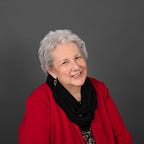Our Young People Are Not Okay
I’ve taught for nearly 5 decades. Wednesday, January 6, 2021 was the toughest day I’ve ever taught.
Teaching during 9–11 was difficult. My questions from young people that day were heart-wrenching:
“Will we all die?”
“Are we going to war?”
“My older brother just turned 18. Will he need to go to war?”
“Why do these people hate us?”
“I keep watching the video of the towers going down. I can’t stop thinking about it.”
Teaching during the dichotomy of ‘justice’ for Black Americans vs white Americans is harsh and gut-wrenching:
“I’m the same age as Tamir Rice. I don’t feel safe.”
“I went to my first protest with my mom. Someone called us the N-word and we were just standing quietly.”
“Why do people judge kids who look like me and call us thugs?”
“My dad taught me how to act if I get pulled over now that I have my license.”
(Looking around at the other teens at the Center). “Did your parents teach you that if you’re white?”
Teaching during the pandemic requires a listening ear and patience. Young people are frustrated, confused and angry. They are valiantly trying to make the best of an ever changing culture with educational expectations that often vary week by week. Their concerns are poignant:
“This isn’t the way I envisioned my senior year. I knew after the class of 2020 graduated it might be difficult, but I truly fear the class of 2021 — me — will face challenges too.”
“I don’t learn well online. How can I increase my ability to learn the way I must now?”
“I feel isolated. I’m alone. My friends have stopped texting me. I think I’m depressed. I think they are too.”
“Being home all the time with my parents isn’t good. They’re ok when they are sober but when they’re not…”
But Wednesday, January 6, 2021 was the worst of all. I received over 40 texts and calls from young people within 24 hours. It brought together hate and racism and young people’s concerns were raw and real.
“I saw a man with a shirt that said ‘Auschwitz didn’t go far enough’. I’m Jewish. Why is that allowed?”
“The confederate flag was in our Capital. In our sacred space. Why was that permitted?”
“It looked like the DC police were sometimes helping them. Why?”
“How will Biden and Harris be protected? I’d be scared if I were Kamala Harris.”
“I can’t vote yet, but when I can, will it even matter? Will my vote be taken away?”
This is about a generation of young people, battered by a pandemic many still disavow, frustrated by adults who do not censure hate and bigotry, and frightened by adult apathy.
I think this text yesterday from an alumni hit home the hardest. “This isn’t the country I served in the military. I gave up a lot to defend this nation. Why?”
This is a small window into the way the young people I serve react. They are astute, they are aware, and they are justifiably angry.
Since 1976, I have been on call. I have not turned off my phone (at one time it was a beeper), even in the hours after six surgeries. I am blessed to be an adult young people know will respond.
I’m not looking for answers from you. I’m not looking for debate. As adult role models, we simply must do better. We need to stand up for what’s right. Silence is complicit. We need to model hope, even when we need to dig deep to find it within ourselves. We need to listen to young people and empower them by hearing their concerns. We need to hold space with them by not always talking and offering advice, but by simply being there to comfort and shield.
Process January 6, 2021 with the young people in your lives. Don’t ignore it. Don’t sugarcoat it. Use it as a teachable moment. They are our future. We cannot let this become something we discuss for a few days and let pass.
This is on all of us.
